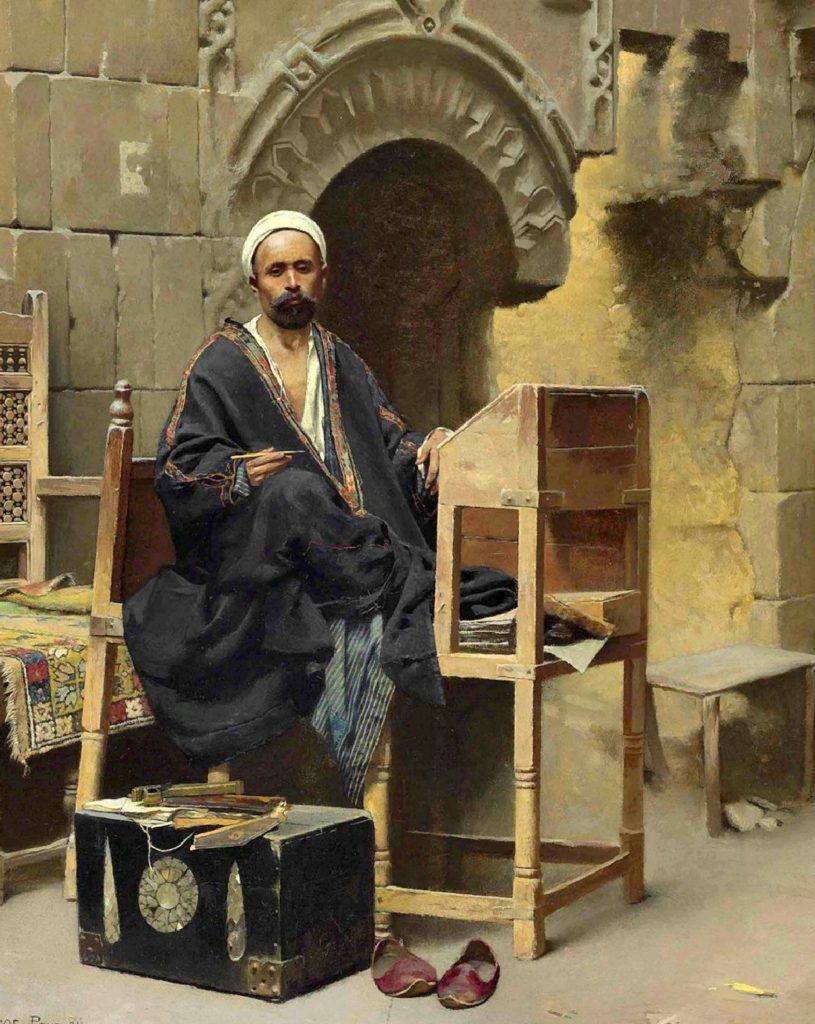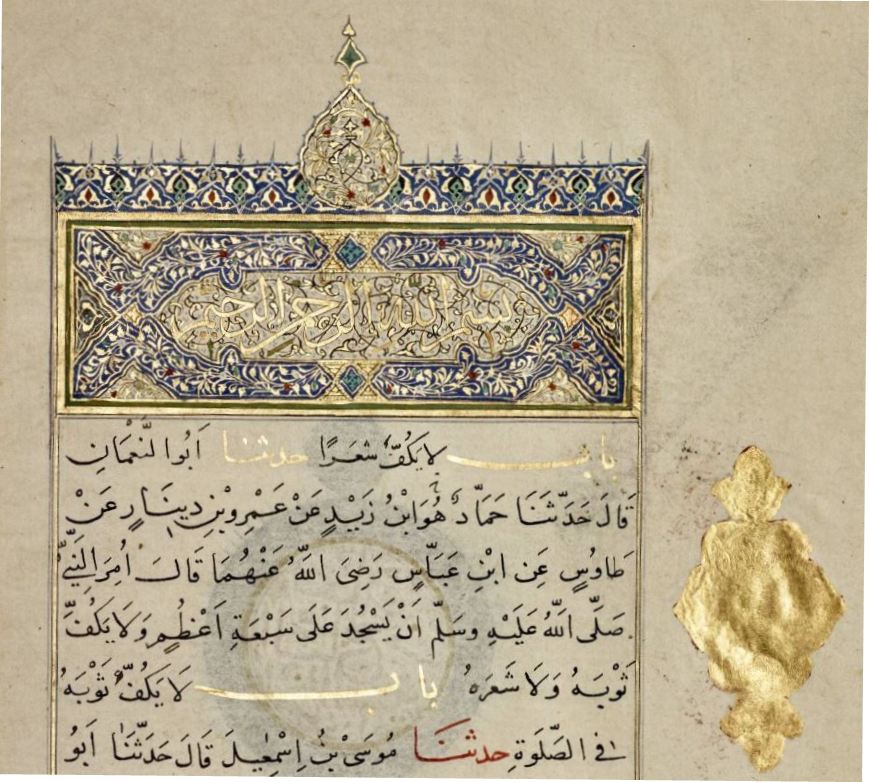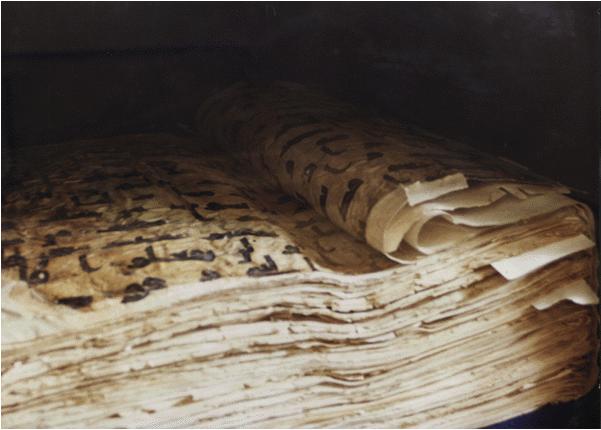
There are many definitions attempting to summarise the essence of being human: a ’thinking animal’, a ‘speaking animal’ and so on. And here it would do no harm to add another definition derived from one of his features – and that is ‘distortion’. So we can justifiably define this man as Homo Pervertens, ‘Distorting Man’, one who distorts his sacred books in particular, in that no holy book has been untouched by his distortions – the Qur’ān included (though it has been the least susceptible to this human habit due to its having being recorded down at an early stage).
THIS HABIT – DISTORTION – seems to be in harmony with the natural course of history, with the character of man and his nature constantly eager for change and alteration and with his disinclination towards stability and consistency or a specific permanent pattern, even if this pattern were a sacred text sent down from an unchanging divinity like unto none other.
The official account of ‘Uthmān ibn ʽAffān’s initiative to collate the muṣḥaf texts was that he feared the dispersion and scattering of the Muslims’ voice and wanted to unite them with one word and one book, particularly following the adoption of Islam by different nations and races speaking many and varied tongues. There are some who see in this endeavour a form of Qurayshī tribal chauvinism represented by a predilection for the dialect of Quraysh and for the unification of the Muslims around it. There are also some who see that the muṣḥafs contained a number of divergences, which necessitated that ‘Uthmān unified the voice of the Muslims on a single muṣḥaf, out of fear of each group cleaving to its own muṣḥaf, with the result that the voice of the Muslims would end up scattered.
But I believe that the principle reason for ‘Uthmān collating the various texts of the muṣḥafs into one muṣḥaf had as its aim the unification of power and political and religious authority. For each one of these muṣḥafs represented a political religious power and an authority value capable of constituting a danger to the head and the official pyramid of power at the time: ‘Uthmān and his Umayyad dynasty. This unification of the muṣḥafs into one official, ‘Uthmānic muṣḥaf and the burning of all other muṣḥafs prevented the distortion of the Qur’ān or halted the ongoing distortions. For in the light of the existence of the other muṣḥafs and the flaring up of struggles for power, each political group was able to place in its muṣḥaf things which would serve their political interests. The history of Muslims and the Companions demonstrates to us that they were not above doing such things.
There are some who see here a form of Qurayshī tribal chauvinism
‘Uthmān’s collating of the muṣḥafs into one muṣḥaf closed off the possibility of further distortions being made to the text, but the opportunity was not entirely removed since there was another avenue for distorting it, one that was perhaps more dangerous than distorting the Qur’ānic text. And that was the initiation of another book alongside the Qur’ān. This motive was not actually a political attempt to disperse the voice of the Muslims or to distort the Qur’ān but rather was aimed at seeking religious legitimisation for a collapsing political tyranny. Thus were born the books of ‘Hadith’ which bear the same name as one of the many borne by the Qur’ān itself, for the word ‘hadīth’ appears as a name for the Qur’ān on five occasions:
So, (O Prophet) perhaps you are going to kill yourself after them, out of grief, if they do not believe in this discourse [Qur’ān XVIII,6]
Allah has sent down the best discourse, a book containing subjects resembling each other, mentioned again and again, shivered from which are the skins of those who have awe of their Lord. Then, their skins and their hearts become soft enough to tend to the remembrance of Allah. This is the Guidance of Allah with which He brings to the right path whomsoever He wills. As for the one whom Allah lets go astray, for him there is no one to guide. [Qur’ān XXXIX,23]
Do you then wonder at this discourse [Qur’ān LIII,59]
Is it this discourse that you take lightly [Qur’ān LVI,81]
So, leave Me alone with those who reject this discourse [Qur’ān LXVIII,44].
This ‘discourse’ – the Qur’ān – did not provide them with the legitimisation they lacked even though the Umayyads and those that succeeded them engaged in interpretive distortion of the Qur’ān, and all the doctors of law allied to the sultans conscripted it for this very purpose – to legitimise their power over the people and their oppression of them. So they were in great need of a book that could grant them more legitimacy and perhaps this is the principle motive behind the creation of ‘discourses’ (hadith) at a certain phase, and their systematic collation in a following phase. For this reason the hadith collectors amounted to no more than employees of the sultans, if indirectly so. They deserve the epithet given to them by the Qur’ān:
The word ‘hadīth’ appears as a name for the Qur’ān on five occasions
But there are, among men those who purchase idle tales, without knowledge, to mislead (men) from the Path of Allah and throw ridicule (on the Path): for such there will be a humiliating Penalty [Qur’ān XXXI,6].
The fear that the Prophet and those Companions who came after him were manifesting on the question of collecting the hadith had some element of reality to it since their expectations and their fears that any other book can assume the role and the station occupied by the Qur’ān itself proved justified. For we see that the taking of the hadith as witness – including fabulous fundamentalist hadith – has become a preamble for many of those who speak in the name of Islam and propagate it today. In so doing they bring to mind the epithet the Qur’ān gave those who abhorred the idea of hearkening purely to the Qur’ān since they are not convinced by a single book, and it therefore being incumbent upon them to invent other books for their preaching purposes.
And when Allah alone is mentioned, the hearts of those who believe not in the Hereafter are repelled, and when those (whom they worship) beside Him are mentioned, behold! they are glad. [Qur’ān XXXIX,45].
The distortion of the Qur’ān in the hadith
1. The Sunnis’ distortion of the Qur’ān
‘A’isha (the mother of the believers) claims that:
There was revealed in the Qur’ān a verse that runs: ten clear sucklings and that this was later changed to ‘five’ so that it became five clear sucklings. The Prophet then passed away and the matter remained as it is.
‘A’isha confirms existence of this verse in the Qur’ān as follows:
Part of what God Almighty revealed in the Qur’ān was ten clear sucklings prohibit and then this was substituted with five clear sucklings prohibit. The Prophet then passed away these words were those that were read in the Qur’ān.
What, then, has become of this highly important verse?[1] ‘A’isha states:
The Verse of the Stoning and the suckling of adults ten times were revealed and contained in a page under my bed. After the Messenger of God passed away and we were busy with arrangements concerning his death a domestic animal crept in and ate it up.
And in another version she states:
The Verse of the Stoning and the suckling of adults ten times were revealed and were on a leaf under my bed in my house. When the Messenger was suffering we busied ourselves attending to him and one of our duwayba came in and ate it up.
Meanwhile Ibn Ḥazm writes:
This is a sound hadith and there is nothing in it to excite suspicion for if the Verse of the Stoning was revealed then it was duly memorised and known of, and the Messenger of God was acting upon it. But the Qur’ān copyists did not write it down in the muṣḥafs and did not establish its expression in the Qur’ān.
And again, there are many accounts of how ‘Umar ibn al-Khaṭṭāb supported what ‘A’isha had said, when he speaks of the existence of the Verse of the Stoning and of its lapsing from the Qur’ān, and how Ubayy Ibn Kaʽb was of the view that it was part of the Ahzāb chapter. For he states:
“How many verses are there in the Aḥzāb chapter?” I said “Seventy-three verses”. He replied “and what of Abū Ibn Kaʽb’s swearing that the number of its verses equalled that of the chapter al-Baqara, or more? For from him we read the Verse of the Stoning: The fornicators among the married men and married women stone them as an exemplary punishment from Allah, and Allah is Mighty and Wise.[2]
It is worth noting that the Sunnis continue to distort the Qur’ān – in much the same way as the Shīʽa do – in that these hadith are contained in their ‘sound’ collections indicating distortions, deficiencies and the incompetence of the Qur’ān as they now have it, as well as their belief and faith in these deficiencies and distortions.

Suggested Reading
2. The Shīʽa distortion of the Qur’ān:
So much for the Sunnis’ distortion of the Qur’ān. As for the distortion by the Shīʽa, this takes on different dimensions, as George Tarabishi writes:
Some of the Shīʽa authorities speak of – or the Sunnis claim that they speak of – the sort of thing that Muḥibb al-Dīn al-Khaṭīb carried out in his work Al-Khuṭūṭ al-ʽArīḍa, where he states that the chapter of Al-Wilāya was omitted from the ‘Uthmānic muṣḥaf. The text of this chapter was as follows: O ye who believe, believe in the Prophet and the friend, whom we have sent both to guide you on the Straight Path, the Prophet and a friend to each other. The controversy concerning this chapter continues to this day on internecine Sunni and Shīʽa websites. While the Shīʽa websites tend to deny the existence of this chapter, and accuse their rivals of having fabricated these to make the distorting the Qur’ān charge stick against the Shīʽa, the Sunni websites maintain that this denial and evasiveness is an example of taqiyya (tactical dissimulation). It is worth noting that some Christian priests have also entered into this debate among the Sunnis and the Shīʽa concerning the chapter of Al-Wilāya omitted from the muṣḥaf, employing against them the claim of distorting the Qur’ān. An example of this is the work by Fr. Yūsuf Durrat al-Ḥaddād in his work Al-Itqān fī Taḥrīf al-Qur’ān, and Fr. Zakariyā Buṭrus in the television channel al-Ḥayāh.[3]
This is just one example of Shīʽa distortion of the Qur’ān, and in fact there are many such examples which cannot be denied by taqiyya since they are firmly fixed in their literature and source books. One may enquire further into this type of distortion in Yaḥyā Muḥammad’s book The Problem of Hadith when there are many details and examples of Shīʽa distortion of the Qur’ān.
[1] The hadith (from Sahih Muslim, Vol. II, p.740) refers to the Qur’ān containing a law forbidding marriage between two people who had been breastfed by the same woman, originally if they had been breastfed by the same woman at least ten times, which was subsequently replaced with ‘five times’. However even this altered verse is missing. The issue in this example, and the one following, is whether the claim of abrogation is demonstrated to be a weak explanation for the disappearance of certain texts from the Qur’ān, and the implications this disappearance has for the integrity of the Qur’ānic text. (Ed.)
[2] ‘And this is merely the tip of the iceberg’, see Nabil Fayyad, أم المؤمنين تأكل أولادها. The account is containted in al-Suyūtī’s Al-Itqān fī ‘Ulūm al-Qur’ān.
[3] George Tarabishi, هرطقات II.
Main picture: ‘The Scribe’ by Raphael von Ambros (1889)

